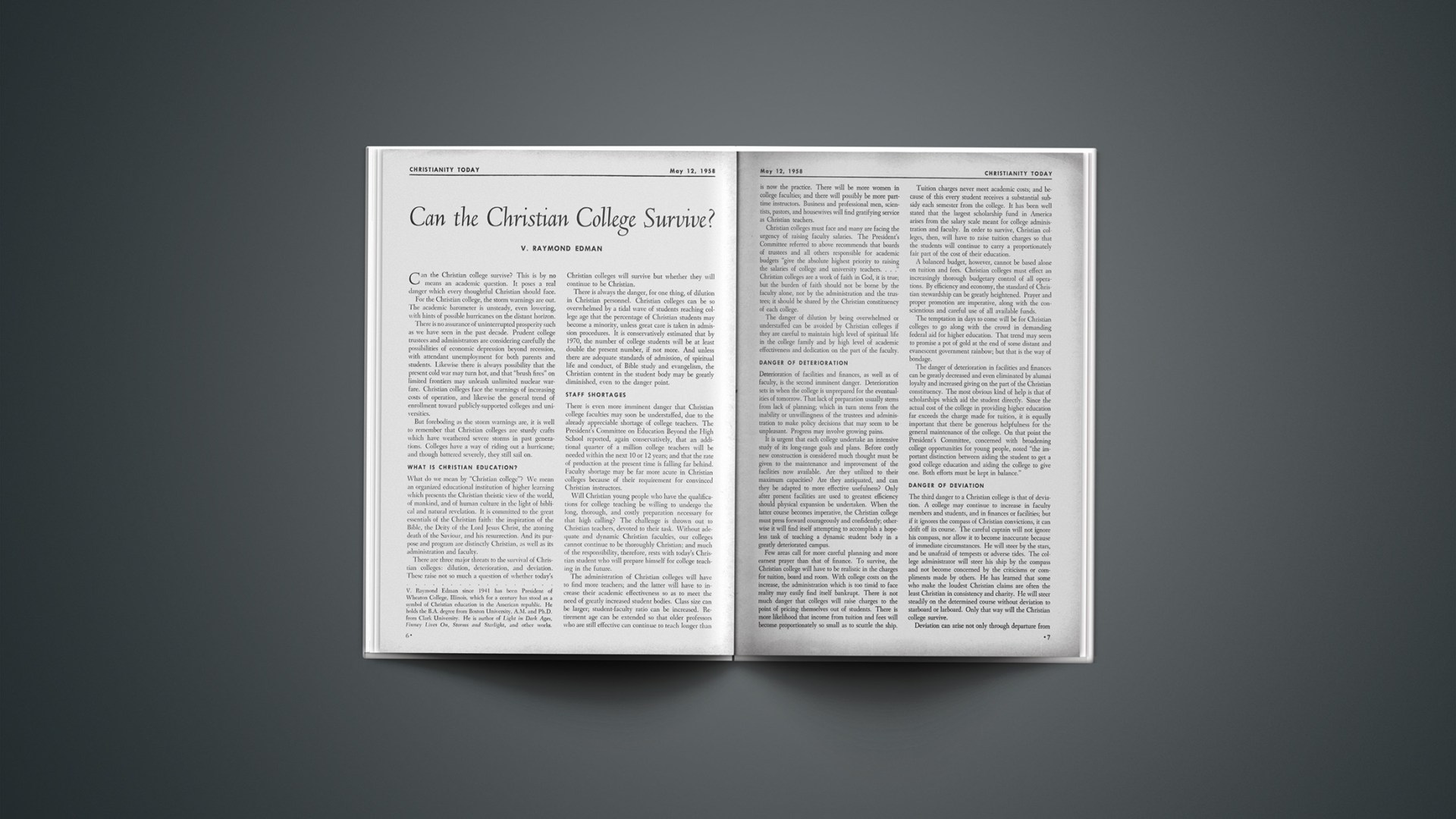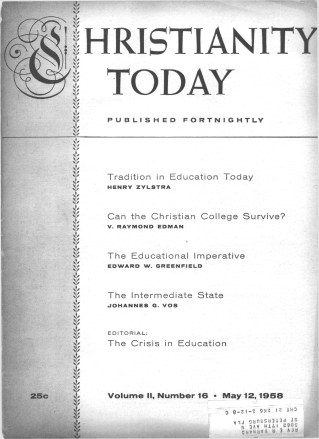Can the Christian college survive? This is by no means an academic question. It poses a real danger which every thoughtful Christian should face.
For the Christian college, the storm warnings are out. The academic barometer is unsteady, even lowering, with hints of possible hurricanes on the distant horizon.
There is no assurance of uninterrupted prosperity such as we have seen in the past decade. Prudent college trustees and administrators are considering carefully the possibilities of economic depression beyond recession, with attendant unemployment for both parents and students. Likewise there is always possibility that the present cold war may turn hot, and that “brush fires” on limited frontiers may unleash unlimited nuclear warfare. Christian colleges face the warnings of increasing costs of operation, and likewise the general trend of enrollment toward publicly-supported colleges and universities.
But foreboding as the storm warnings are, it is well to remember that Christian colleges are sturdy crafts which have weathered severe storms in past generations. Colleges have a way of riding out a hurricane; and though battered severely, they still sail on.
What Is Christian Education?
What do we mean by “Christian college”? We mean an organized educational institution of higher learning which presents the Christian theistic view of the world, of mankind, and of human culture in the light of biblical and natural revelation. It is committed to the great essentials of the Christian faith: the inspiration of the Bible, the Deity of the Lord Jesus Christ, the atoning death of the Saviour, and his resurrection. And its purpose and program are distinctly Christian, as well as its administration and faculty.
There are three major threats to the survival of Christian colleges: dilution, deterioration, and deviation. These raise not so much a question of whether today’s Christian colleges will survive but whether they will continue to be Christian.
There is always the danger, for one thing, of dilution in Christian personnel. Christian colleges can be so overwhelmed by a tidal wave of students reaching college age that the percentage of Christian students may become a minority, unless great care is taken in admission procedures. It is conservatively estimated that by 1970, the number of college students will be at least double the present number, if not more. And unless there are adequate standards of admission, of spiritual life and conduct, of Bible study and evangelism, the Christian content in the student body may be greatly diminished, even to the danger point.
Staff Shortages
There is even more imminent danger that Christian college faculties may soon be understaffed, due to the already appreciable shortage of college teachers. The President’s Committee on Education Beyond the High School reported, again conservatively, that an additional quarter of a million college teachers will be needed within the next 10 or 12 years; and that the rate of production at the present time is falling far behind. Faculty shortage may be far more acute in Christian colleges because of their requirement for convinced Christian instructors.
Will Christian young people who have the qualifications for college teaching be willing to undergo the long, thorough, and costly preparation necessary for that high calling? The challenge is thrown out to Christian teachers, devoted to their task. Without adequate and dynamic Christian faculties, our colleges cannot continue to be thoroughly Christian; and much of the responsibility, therefore, rests with today’s Christian student who will prepare himself for college teaching in the future.
The administration of Christian colleges will have to find more teachers; and the latter will have to increase their academic effectiveness so as to meet the need of greatly increased student bodies. Class size can be larger; student-faculty ratio can be increased. Retirement age can be extended so that older professors who are still effective can continue to teach longer than is now the practice. There will be more women in college faculties; and there will possibly be more part-time instructors. Business and professional men, scientists, pastors, and housewives will find gratifying service as Christian teachers.
Christian colleges must face and many are facing the urgency of raising faculty salaries. The President’s Committee referred to above recommends that boards of trustees and all others responsible for academic budgets “give the absolute highest priority to raising the salaries of college and university teachers.…” Christian colleges are a work of faith in God, it is true; but the burden of faith should not be borne by the faculty alone, nor by the administration and the trustees; it should be shared by the Christian constituency of each college.
The danger of dilution by being overwhelmed or understaffed can be avoided by Christian colleges if they are careful to maintain high level of spiritual life in the college family and by high level of academic effectiveness and dedication on the part of the faculty.
Danger Of Deterioration
Deterioration of facilities and finances, as well as of faculty, is the second imminent danger. Deterioration sets in when the college is unprepared for the eventualities of tomorrow. That lack of preparation usually stems from lack of planning; which in turn stems from the inability or unwillingness of the trustees and administration to make policy decisions that may seem to be unpleasant. Progress may involve growing pains.
It is urgent that each college undertake an intensive study of its long-range goals and plans. Before costly new construction is considered much thought must be given to the maintenance and improvement of the facilities now available. Are they utilized to their maximum capacities? Are they antiquated, and can they be adapted to more effective usefulness? Only after present facilities are used to greatest efficiency should physical expansion be undertaken. When the latter course becomes imperative, the Christian college must press forward courageously and confidently; otherwise it will find itself attempting to accomplish a hopeless task of teaching a dynamic student body in a greatly deteriorated campus.
Few areas call for more careful planning and more earnest prayer than that of finance. To survive, the Christian college will have to be realistic in the charges for tuition, board and room. With college costs on the increase, the administration which is too timid to face reality may easily find itself bankrupt. There is not much danger that colleges will raise charges to the point of pricing themselves out of students. There is more likelihood that income from tuition and fees will become proportionately so small as to scuttle the ship.
Tuition charges never meet academic costs; and because of this every student receives a substantial subsidy each semester from the college. It has been well stated that the largest scholarship fund in America arises from the salary scale meant for college administration and faculty. In order to survive, Christian colleges, then, will have to raise tuition charges so that the students will continue to carry a proportionately fair part of the cost of their education.
A balanced budget, however, cannot be based alone on tuition and fees. Christian colleges must effect an increasingly thorough budgetary control of all operations. By efficiency and economy, the standard of Christian stewardship can be greatly heightened. Prayer and proper promotion are imperative, along with the conscientious and careful use of all available funds.
The temptation in days to come will be for Christian colleges to go along with the crowd in demanding federal aid for higher education. That trend may seem to promise a pot of gold at the end of some distant and evanescent government rainbow; but that is the way of bondage.
The danger of deterioration in facilities and finances can be greatly decreased and even eliminated by alumni loyalty and increased giving on the part of the Christian constituency. The most obvious kind of help is that of scholarships which aid the student directly. Since the actual cost of the college in providing higher education far exceeds the charge made for tuition, it is equally important that there be generous helpfulness for the general maintenance of the college. On that point the President’s Committee, concerned with broadening college opportunities for young people, noted “the important distinction between aiding the student to get a good college education and aiding the college to give one. Both efforts must be kept in balance.”
Danger Of Deviation
The third danger to a Christian college is that of deviation. A college may continue to increase in faculty members and students, and in finances or facilities; but if it ignores the compass of Christian convictions, it can drift off its course. The careful captain will not ignore his compass, nor allow it to become inaccurate because of immediate circumstances. He will steer by the stars, and be unafraid of tempests or adverse tides. The college administrator will steer his ship by the compass and not become concerned by the criticisms or compliments made by others. He has learned that some who make the loudest Christian claims are often the least Christian in consistency and charity. He will steer steadily on the determined course without deviation to starboard or larboard. Only that way will the Christian college survive.
Deviation can arise not only through departure from Christian convictions of faith and practice, of Christian purposes and principles, but also from a lack of responsibility on the part of the college to its Christian constituency. History shows us the peril that occurs when a Christian college determines to depart from the faith of its founding fathers. In the past some have veered from the faith without that deviation being known immediately to the godly parents of students or Christians supporting the college.
That danger of irresponsibility to one’s constituency can be avoided only as a Christian college maintains its Christian convictions and continues on its appointed course. With good conscience toward God and man, it must maintain the faith of the fathers and its faithfulness to its friends. It does well to keep its constituency informed of its progress and its problems; but it does well to nail its colors to the mast and then to be true to those colors.
There is more danger, however, that a Christian college will drift off course than make definite decisions so to do. My study of American colleges leads me to the conclusion that deviation from Christian persuasion and principle always begins at the top; that is, spiritual decay starts in the trustees and administration; and not in the student body. It is therefore of greatest importance that Christian colleges exercise care in admitting only committed and conscientious Christians as trustees and officers of the college.
It is imperative that the Christian college know itself, the heritage of its past, the Christian persuasion of its founding fathers, and stand proud thereof, in the right sense. Each generation ought to consist of Christians who are true to themselves and especially to the Saviour. Well did Solomon make the observation: “Remove not the ancient landmarks which thy fathers have set.”
The Christian college must also be itself, not a pale copy of some publicly-supported college or university. While offering education on the highest academic level, it must remain thoroughly Christian in its philosophy of education, its practice, and its objectives. In the determination of its policies, it must persist in its application to current problems. That is, it must determine its size, its basic organization, its curriculum, and its graduation requirements, while, above all, maintaining a high spiritual standard for the entire college family.
With devotion to duty and dedication to appointed task; with diligence in performing responsibility and delight in leading young hearts in the Way Everlasting, the Christian college can and will survive.
V. Raymond Edman since 1941 has been President of Wheaton College, Illinois, which for a century has stood as a symbol of Christian education in the American republic. He holds the B.A. degree from Boston University, A.M. and Ph.D. from Clark University. He is author of Light in Dark Ages, Finney Lives On, Storms and Starlight, and other works.










